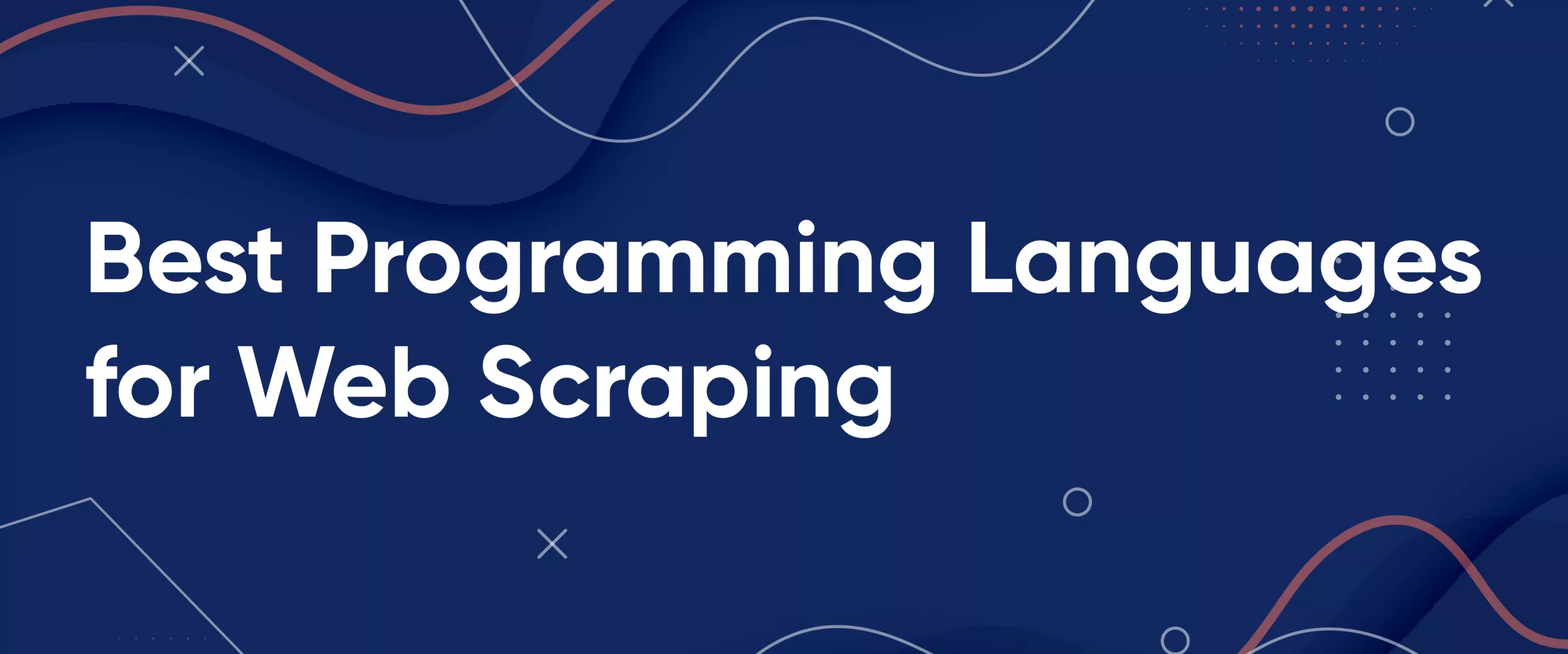Almost every programming language can be used for data scraping. But some of them have more tools, libraries, or frameworks. Choosing the best coding language for web scraping should depend on the flexibility of language, ease of coding, operational ability to feed database, scraping effectiveness, scalability, and avoiding blocking and detecting mechanisms.
For those who already know any programming language, it will be easier: either adapt the existing functions of a well-known programming language for their tasks or learn the most similar syntax. However, one can also choose by the number of scraping tools.
Try out Web Scraping API with proxy rotation, CAPTCHA bypass, and Javascript rendering.
Our no-code scrapers make it easy to extract data from popular websites with just a few clicks.
Tired of getting blocked while scraping the web?
Try now for free
Collect structured data without any coding!
Scrape with No Code
Top 10 Languages for Scraping
However, for those who are just starting their way in programming, there is a great opportunity to get acquainted with 10 programming languages used for web scraping and choose one of the best programming languages for web scraping. They are:
- Python. The most popular programming language for web scraping and data science. Has tools to scrape dynamic and static web pages.
- Ruby. It's perfect for scraping static web pages with constant URLs.
- Node.js. Node.js is faster than Python but has fewer tools for web scraping. Good for scraping dynamic data.
- Golang. The support for concurrency has made Go a fast, powerful language, and because the language is easy to get started with, one can faster build his first web scraper.
- Perl. Perl is very good at text parsing and has good regular expression support so it's a natural fit for web scraping.
- PHP. It is a widely used back-end scripting language for creating dynamic websites and web applications. So it is not so difficult to make a web scraper using plain PHP code.
- C#. C#, and .NET in general, have all the necessary tools and libraries for making a data scraper.
- C & C++. They allow one to create his own HTML parsing library that perfectly suits his needs, and they make it easier to parallelize web scraper.
- Java. Not only JavaScript (Node.JS) is used for data scraping but Java is used too.
- Rust. It isn’t a popular language for scraping, but it gets the job done quite easily.
So, let's try to find the best one for web scraping.
Get fast, real-time access to structured Google search results with our SERP API. No blocks or CAPTCHAs - ever. Streamline your development process without worrying…
Gain instant access to a wealth of business data on Google Maps, effortlessly extracting vital information like location, operating hours, reviews, and more in HTML…
Python Programming Language
Python is the most commonly used programming language for data science and web scraping. Python is easy to write, read, and understand. Unlike other programming languages such as Java or C++, Python has a fairly low entry barrier and a high learning rate. Moreover, due to the fact that the language is interpreted (execution of program code is performed line by line without prior compilation), the speed of the program is significantly increased.
Also, Python is developing rapidly and intensively. With each version, the performance of the language improves and the syntax improves. For example, version 3.8 has a new walrus operator ":=", which is quite a serious event for any language. In languages such as C++ or Java, the rate of change is noticeably slower - they are approved by a special commission that meets every few years.
Python has a lot of libraries, frameworks, and tools to work with web scraping: Requests library (is a built-in library), Beautiful soup, Selenium library, Scrapy framework, Puppeteer, URLlib, lxml and etc. Thanks to a wide variety of tools, Python allows performing all the necessary tasks: whether it is parsing dynamic data, setting up a proxy, or working with a simple HTTP request.
Ruby for Scraping Web Pages
Ruby is one of the most popular open-source programming languages. Due to its simplicity and performance, Ruby is ideal for creating scraper bots. Unlike other programming languages, Ruby provides the ability to create bots that can search for HTML documents using CSS selectors.
Ruby combines several programming languages - Perl, Smalltalk, Eiffel, Ada, and Lip. Ruby is one of the easiest web scraping languages, it requires less writing for such a language and no signs of code repetition take place Ruby is supported by a community of users.
It also has packaging managers, or RubyGems, like HTTParty and NokoGiri, that can help to set up web scrapers.
Scrape Dynamic Data with Node.js
Based on javascript, Node.JS is a good coding option for web scraping javascript pages and websites. Node.JS is suitable and fully recommended to be used for streaming, socket-based implementation, and API.
Many people use Node.JS for multiple instances for the same scraping project as Node.JS takes only one core of the Central Processing Unit (CPU). Node.JS has a number of libraries that allow one to scrape data: puppeteer, cheerio, node-fetch, JSDOM and etc.
Golang for Beginners
Recently, the Golang programming language has become quite popular, which can be easily used to create a Golang web scraper. Choosing a flexible and easily scalable scraper such as the Golang web scraper can make data collection easy in the short and long term.
Golang is the best language for those who want to get started scraping fast - it will give a simple code that will be enough to parse HTML. To do web scraper on Go-lang one can use such third-party libraries as Goquery or Colly.
Web Crawling with Perl
Perl is great for text parsing and has good support for regular expressions, so it's perfect for web scraping. It also has a strong online community (CPAN) which has developed many libraries useful for parsing.
Perl's most popular web scraping module is WWW::Mechanize, which is great if one wants to not only get the target page but navigate to it using links or forms, such as for login. Of course, Perl has other less popular libraries for web scraping, for example, HTML::TreeBuilder, Mojo, or Jada.
Perl can also be written in a very concise manner, which gives the ability to get started quickly.
Try out Web Scraping API with proxy rotation, CAPTCHA bypass, and Javascript rendering.
Our no-code scrapers make it easy to extract data from popular websites with just a few clicks.
Tired of getting blocked while scraping the web?
Try now for free
Collect structured data without any coding!
Scrape with No Code
Data Extraction with PHP
PHP is a programming language that is used to work with web content. To work with data scraping, PHP has several libraries: libcurl, Nokogiri, Zend_DOM_Query, htmlSQL, FluentDOM, and Ganon.
PHP is also highly compatible with HTML and supports regular expressions, through which the parser processes information.
Due to the fact that PHP allows implementing scripts, most of the parsers written on it will work in a similar way. The execution algorithm will be the following:
- Create a request by URL.
- Receive a response from the server as HTML.
- Analyze the received data.
- Extract the required elements.
- Form and display the result.
The result can be written to files and databases, as well as directly displayed on the device display. In general, it is not too complex, but very powerful language.
C# for big Web Scraping Projects
C# is a modern, simple, high-level object-oriented programming language that compiles to CRL and can be JIT-interpreted in ASP.NET. Besides web scraping, C# is mainly used for application and game development.
In the case of C# parsing, this language makes it much easier to associate the collected data with APIs, external interfaces, and databases. It also allows you to collect data from multiple websites and supports API scraping and web scraping.
C & C++ for Balance Functional Programming
Using C & C++ is a great choice when one needs to write a powerful parser with dynamic coding. It allows writing one's own HTML parsing library according to specific requirements and tasks.
C++ allows parallelizing any parser without any effort. However, the main disadvantage of these programming languages is that setting up parsers with them can be resource-intensive.
Extract Data with Java
Compared to other programming languages, Java has better networking capabilities and is more flexible in terms of scalability. Thanks to the many libraries for parsing XML and HTML, Java has become a convenient tool for creating a web scraper. There are three most commonly used libraries and frameworks for web scraping with Java— JSoup, Jaunt, and HtmlUnit.
For those who use Java 9, it became possible to create scripts. One can also use any of the over 20 JVM languages for web scraping. These languages allow you to use any of the Java libraries and can be used either as a scripting language or can be compiled Java byte code. Therefore, it is possible to write Javascript scripts using Java libraries.
Crawling Websites with Rust
Rust is a statically-typed programming language designed for performance and safety, especially safe concurrency and memory management.
Using Rust is a good idea to parse simple things. Also, Rust has good parser generator libraries. If the scraping will be IO-bound, Rust will be excessive. Actually, it requires a little bit of care to reach the same IO performance of Node.JS with its async runtime.
The most common library used for web scraping in Rust is select.rs.
Conclusion and Takeaways
So, it is not so easy to choose the best programming language for web scraping. Most of them have CSS selector support, and all of them have specialized libraries or frameworks and their own features that make them suitable for web scraping.
| Language | User friendly | Well documented libraries | Popular | Scraping Speed | Good for scraping dynamic data | Useful additional features |
|---|---|---|---|---|---|---|
| Python | High | High | High | Middle | High | Middle |
| Ruby | High | High | High | Middle | Low | Middle |
| Node.JS | Middle | High | Middle | High | High | High |
| Golang | High | High | High | High | Low | Middle |
| Perl | Middle | Middle | Middle | Middle | Middle | Middle |
| PHP | High | High | High | High | Middle | High |
| C# | Middle | High | Middle | Middle | Low | Middle |
| C & C++ | Low | High | Middle | Low | Middle | High |
| Java | High | High | Middle | Low | High | High |
| Rust | High | Middle | Low | High | Middle | Middle |
Everyone should choose the language that will be the best for him and more suitable for every specific project.

